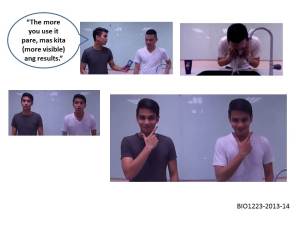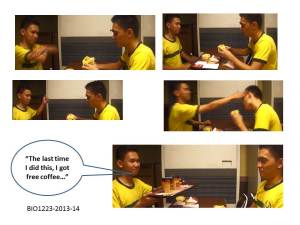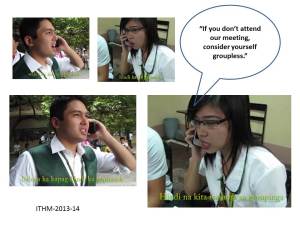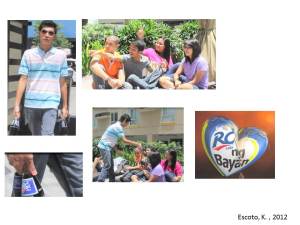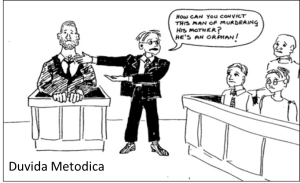Overview:
This module engages the students to determine the fallacies committed in an argument. As part of mastery, this module will enable students to create scenarios that reflect erroneous reasoning.
Objectives:
- recognize fallacies in arguments
- identify the various kinds of informal fallacy; and
- create various scenarios depicting an erroneous reasoning or argument.
Content Outline:
Informal Fallacies
- Argumentum Ad Hominem
- False Cause
- Argumentum Ad Ignoratiam
- Argumentum Ad Baculum
- Argumentum Ad Populum
- Equivocation
- Composition
- Division
- Argumentum Ad Verecundiam
- Argumentum Ad Misericordiam
- Accent
Unlocking of Terms:
- fallacies-lies and faulty arguments that, although incorrect, are subjectively convincing (Demeterio, 1997, p56)
Pre-Learning Activity (Group):
Each group will list down three fallacies that they witness every day in multimedia. The spokesperson for each group will share their ideas to the class.
Informal Fallacies
Ad Hominem-attacks not the issue but the person of the opponent
A female senator to a male senator: “Now he is the poster boy of stem cell treatment that has long gone past its expiry date. He looks like a female llama surprised in her bath. He reminds me of nothing so much as a dead fish, before it has time to stiffen. If he has the courage, he should switch place with me: He should be funny, and I’ll be the asshole” (Ager, 2013).
False Cause-the effect is attributed not to its real cause
Ad Ignoratiam-the failure to prove one side is a ground to conclude the truth of the other side (Demeterio, 1997, p66)
Ad Baculum-when threat of force is used instead of proper reason (Demeterio, 1997, p62)
A female student to her group mate:
Ad Populum
Bandwagon-the fallacy of attempting to prove a conclusion on the grounds that all or most people think or believe it is true (Archie, L., 2011)
Equivocation-the fallacy is committed when a word carrying different meanings is used in the same context in a particular argument (Santiago, 2011, p218).
Composition-what should be taken individually is taken collectively
Gamboa, a Filipino cab driver in Nevada is honest. Thus, all Filipino cab drivers in Nevada are honest.
Division-what should be taken collectively is taken individually
The Philippines is one of the world’s friendliest countries. It follows that every Filipino is friendly.
Ad Verecundiam-citing an authority in one given field regarding an issue that is outside his field of competence (Demeterio, 1997, p61)
Ad Misericordiam- the fallacy committed when pity or a related emotion such as sympathy or compassion is appealed to for the sake of getting a conclusion accepted (Archie, L., 2011).
Accent-arises from false emphasis (Santiago, 2011, p 221).
Practice (Dyad):
Exercise 7a: Informal Fallacies
Evaluation (Individual):
Exercise 7b: Informal Fallacies
Mastery (Group):
Construct a comic strip reflecting erroneous arguments. The scenarios must be related to the course of the students.
References
| Creativity | 10% |
| Correctness of the example | 60% |
| Real-life scenarios presented | 20% |
References
Ager, M. (December 4, 2013). Santiago lists Enrile’s sins. Inquirer.net. Retrieved October 5, 2014 from http://newsinfo.inquirer.net/540235/santiago-enrile-is-mastermind-of-pork-scam
Archie, L. (2011). Introduction to Logic. Retrieved October 5, 2014 from http://philosophy.lander.edu/logic/popular.html
Copi, I. and Cohen, C. (1990). Introduction to logic. New York: Macmillan
Demeterio, F. (1997). Logic, the philosophy of systematic thinking and argumentation. Manila: San Beda College
Dowden, B. (2010). Fallacies. Internet encyclopedia of philosophy. Retrieved October 5, 2014 from http://www.iep.utm.edu/fallacy/
Bottorff, E. (2011). Philosophy 105: logic. Retrieved October 5, 2014 from http://www.oakton.edu/user/4/ebottorf/Lecture6.pdf
Greenfield, B. (January 6, 2012). The world’s friendliest countries. Forbes. Retrieved October 5, 2014 from http://www.forbes.com/pictures/egim45edme/8-philippines/
Kemerling, G. (2011). Philosophy pages. Retrieved July 29, 2014 from http://www.philosophypages.com/lg/e08a.htm.
Lariosa, J. (December 27, 2013). Fil-Am driver returns $300K left in his taxi. The Philippine Star. Retrieved October 5, 2014 from http://www.philstar.com/headlines/2013/12/27/1272337/fil-am-driver-returns-300k-left-his-taxi
Leclerc, P. (2004). Logic: informal fallacies of relevance. Retrieved October 5, 2014 from http://faculty.ccri.edu/paleclerc/logic/fallacies_relev.shtml
Santiago, A. (2006). Logic: the art of reasoning. Manila: Redman Printing Press.
